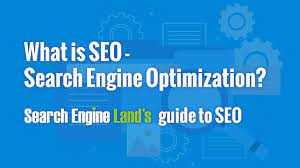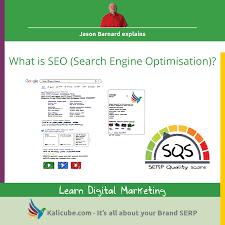SEO Best Practices: Maximizing Your Online Visibility
In today’s digital landscape, Search Engine Optimization (SEO) plays a crucial role in determining the online success of businesses. By implementing the best SEO practices, you can enhance your website’s visibility, attract more organic traffic, and ultimately drive conversions. Here are some key strategies to consider:
Keyword Research and Targeting
Effective keyword research is the cornerstone of any successful SEO strategy. By identifying relevant keywords with high search volume and low competition, you can optimise your content to rank higher in search engine results pages (SERPs).
Optimising On-Page Elements
Ensure that your website’s on-page elements, such as titles, meta descriptions, headings, and image alt text, are optimised for relevant keywords. This helps search engines understand the context of your content and improves your chances of ranking well.
Quality Content Creation
Creating high-quality, engaging content is essential for both users and search engines. By producing valuable content that addresses the needs of your target audience, you can establish authority in your niche and attract natural backlinks.
Mobile-Friendly Design
In an increasingly mobile-centric world, having a responsive website design is crucial for SEO success. Ensure that your site is optimised for mobile devices to provide a seamless user experience and improve your search engine rankings.
Link Building Strategies
Building a strong backlink profile is vital for improving your website’s authority and credibility. Implement white-hat link building strategies such as guest blogging, influencer outreach, and creating shareable content to earn quality backlinks from reputable sources.
Monitoring and Analysis
Regularly monitor your website’s performance using tools like Google Analytics and Search Console. Analyse key metrics such as traffic sources, bounce rates, and keyword rankings to identify areas for improvement and fine-tune your SEO strategy accordingly.
By incorporating these best SEO practices into your digital marketing efforts, you can position your business for long-term success in the competitive online landscape. Stay informed about industry trends and algorithm updates to stay ahead of the curve and maximise your online visibility.
Top 8 Benefits of SEO: Boosting Visibility, Traffic, and Brand Authority
- Improved online visibility
- Increased organic traffic
- Higher search engine rankings
- Enhanced user experience
- Established brand authority
- Cost-effective marketing strategy
- Long-term sustainable results
- Measurable and trackable outcomes
Challenges of SEO Best Practices: Time, Delayed Results, Competition, and User Experience
- SEO best practices require continuous monitoring and adjustment, which can be time-consuming and resource-intensive.
- Implementing SEO best practices does not guarantee immediate results, as it may take time to see significant improvements in search engine rankings.
- Following SEO best practices alone may not be sufficient to outperform competitors who are also investing in advanced digital marketing strategies.
- Over-optimisation of content for search engines while adhering to SEO best practices can sometimes compromise the overall user experience.
Improved online visibility
One of the key benefits of implementing the best SEO practices is the significant improvement in online visibility that it offers to businesses. By optimising your website for relevant keywords, enhancing on-page elements, and building a strong backlink profile, you can increase your chances of ranking higher in search engine results pages (SERPs). This heightened visibility not only attracts more organic traffic to your site but also helps you reach a wider audience and establish credibility within your industry. Improved online visibility through SEO best practices ultimately leads to enhanced brand awareness, increased website traffic, and greater opportunities for engagement and conversions.
Increased organic traffic
One of the key benefits of implementing best SEO practices is the significant increase in organic traffic to your website. By optimising your site for relevant keywords, creating high-quality content, and building a strong backlink profile, you can attract more visitors who are actively searching for products or services related to your business. Increased organic traffic not only boosts your website’s visibility in search engine results pages but also enhances the likelihood of attracting qualified leads and potential customers who are genuinely interested in what you have to offer. This surge in organic traffic can lead to improved brand awareness, higher engagement rates, and ultimately, increased conversions for your business.
Higher search engine rankings
One significant advantage of implementing the best SEO practices is the potential for achieving higher search engine rankings. By optimising your website with relevant keywords, quality content, and effective link building strategies, you can improve your visibility in search engine results pages (SERPs). Higher rankings not only increase your website’s organic traffic but also enhance brand credibility and trust among users searching for products or services in your industry. This increased visibility can lead to more clicks, conversions, and ultimately, greater online success for your business.
Enhanced user experience
One of the key advantages of implementing best SEO practices is the enhancement of user experience on your website. By focusing on factors such as site speed, mobile responsiveness, and quality content, you not only improve your search engine rankings but also create a seamless and engaging experience for your visitors. A well-optimised website that is easy to navigate, loads quickly, and provides valuable information can lead to increased user satisfaction, longer visit durations, and higher conversion rates. Prioritising user experience through SEO best practices can ultimately result in building stronger relationships with your audience and establishing trust in your brand.
Established brand authority
Established brand authority is a significant benefit of implementing the best SEO practices. By consistently optimising your website for search engines and producing high-quality, relevant content, you can enhance your brand’s credibility and reputation within your industry. When search engines recognise your website as a reliable source of information, it not only boosts your visibility in search results but also instils trust in your target audience. Building a strong brand authority through SEO can lead to increased organic traffic, higher conversion rates, and long-term success in the digital landscape.
Cost-effective marketing strategy
One of the key advantages of implementing the best SEO practices is its cost-effectiveness as a marketing strategy. Unlike traditional advertising methods that often require significant financial investment, SEO offers a sustainable and affordable way to increase your online visibility and reach your target audience. By focusing on organic search results and optimising your website for relevant keywords, you can attract quality traffic without having to continuously pay for ad placements. This makes SEO an attractive option for businesses looking to maximise their marketing budget and achieve long-term success in the digital realm.
Long-term sustainable results
One of the key advantages of implementing the best SEO practices is the ability to achieve long-term sustainable results. By focusing on organic search visibility and continuously improving your website’s SEO performance, you can establish a strong online presence that endures over time. Unlike short-term marketing tactics, such as paid advertising, SEO efforts have a lasting impact on your website’s ranking and visibility in search engine results. This sustainability not only leads to consistent traffic and engagement but also builds trust with both users and search engines, positioning your business for continued success in the digital realm.
Measurable and trackable outcomes
One of the key advantages of implementing the best SEO practices is the ability to achieve measurable and trackable outcomes. By leveraging tools such as Google Analytics and Search Console, businesses can monitor their website’s performance in real time, track key metrics like organic traffic, keyword rankings, and conversion rates, and gain valuable insights into the effectiveness of their SEO strategies. This data-driven approach allows for continuous optimization and refinement, enabling businesses to make informed decisions that drive tangible results and enhance their online visibility over time.
SEO best practices require continuous monitoring and adjustment, which can be time-consuming and resource-intensive.
Implementing SEO best practices demands ongoing monitoring and adjustment, posing a significant challenge in terms of time and resources. Constantly keeping track of algorithm changes, keyword performance, and competitor strategies can be a time-consuming endeavour. Moreover, the need for regular adjustments to stay ahead in the ever-evolving digital landscape can strain resources and require dedicated attention. Despite the demands, staying vigilant and adapting to these changes is crucial for maintaining a competitive edge and achieving sustainable SEO success in the long run.
Implementing SEO best practices does not guarantee immediate results, as it may take time to see significant improvements in search engine rankings.
Implementing SEO best practices does not guarantee immediate results, as it may take time to see significant improvements in search engine rankings. While following SEO guidelines and strategies can enhance your website’s visibility and organic traffic over time, it is important to understand that SEO is a long-term investment that requires patience and consistent effort. Factors such as competition, industry trends, and search engine algorithms can influence the pace at which your website climbs the rankings. Therefore, businesses should approach SEO with a strategic mindset, focusing on sustainable growth and gradual improvements rather than expecting instant gratification.
Following SEO best practices alone may not be sufficient to outperform competitors who are also investing in advanced digital marketing strategies.
While adhering to SEO best practices is essential for improving online visibility and search engine rankings, it may not guarantee a competitive edge over rivals who are utilising more advanced digital marketing tactics. In today’s highly competitive digital landscape, simply following SEO guidelines may not be adequate to surpass competitors who are implementing comprehensive strategies that encompass social media marketing, paid advertising, influencer collaborations, and other innovative techniques. To stay ahead in the digital race, businesses need to combine SEO best practices with a holistic approach to digital marketing that embraces creativity, adaptability, and continuous evolution.
Over-optimisation of content for search engines while adhering to SEO best practices can sometimes compromise the overall user experience.
When focusing on SEO best practices, one potential drawback is the risk of over-optimising content for search engines, which may inadvertently impact the overall user experience. By excessively prioritising keywords and search engine requirements, there is a possibility of diluting the quality and relevance of the content from a user’s perspective. Striking a balance between SEO optimisation and user-centricity is crucial to ensure that the content remains valuable, engaging, and informative for visitors while still meeting the technical requirements for search engine visibility.




